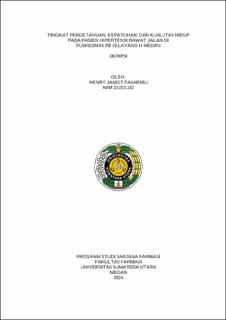Tingkat Pengetahuan, Kepatuhan, dan Kualitas Hidup pada Pasien Hipertensi Rawat Jalan di Puskesmas PB Selayang II Medan
Levels of Knowledge, Compliance, and Quality of Life in Outpatient Hypertension Patients at PB Selayang II Health Center, Medan

Date
2024Author
Pasaribu, Henry Jamot
Advisor(s)
Nasution, Embun Suci
Novriani, Erida
Metadata
Show full item recordAbstract
Background: Hypertension is a condition or situation where a person experiences an increase in blood pressure above normal limits which will cause illness and even death.
Objective: To determine the significant differences between respondent characteristics and knowledge, compliance, and quality of life in hypertensive patients as well as the relationship between knowledge, compliance, and quality of life in outpatient hypertensive patients at the PB Selayang II Health Center, Medan.
Methods: Cross-sectional descriptive research. used a questionnaire to assess the level of knowledge, attitudes and compliance, and quality of life in hypertensive patients. This research was conducted in July-August 2024 at the PB Selayang II Medan community health center
Results: From the results of the study obtained 101 respondents, there were 9 people who refused to be respondents (respondent rate 91.81%) the majority of patients were female 65 respondents (64.4%); aged 56-65 years 40 respondents (39.6%); college graduates as many as 51 respondents (52.6%); retired / not working / housewife 69 respondents (68.3%); long suffering from HT > 5 years as many as 53 respondents (52.5%), and had other comorbidities as many as 69 respondents (68.3%). It was obtained that the majority of knowledge level was high (86.1%); the majority of compliance was obedient (62.4%); and the majority of quality of life was good (93.1%). Based on the Kruskal Wallis test, there was a significant difference between gender and education level on knowledge. Only the length of suffering had a significant difference on the level of compliance. Meanwhile, education level, occupation, and comorbidities had significant differences in the level of quality of life of hypertensive patients (p-value <0.05). Based on Spearman's rho test, there is a relationship between knowledge and medication adherence with a low correlation (r = 0.277), while there is no relationship between adherence and quality of life with a very low correlation (r = 0.116).
Conclusion: The level of knowledge, compliance, and quality of life of hypertensive patients is mostly good. Gender and education level have a significant difference on the level of knowledge, only the length of suffering has a significant difference on the level of compliance, and the level of education, employment and comorbidities have a significant difference on the level of quality of life of hypertensive patients. Based on Spearman's rho test, there is a relationship between knowledge and medication compliance, while there is no relationship between compliance and quality of life.
Collections
- Undergraduate Theses [1719]
